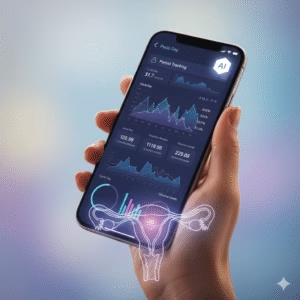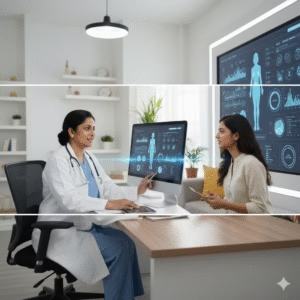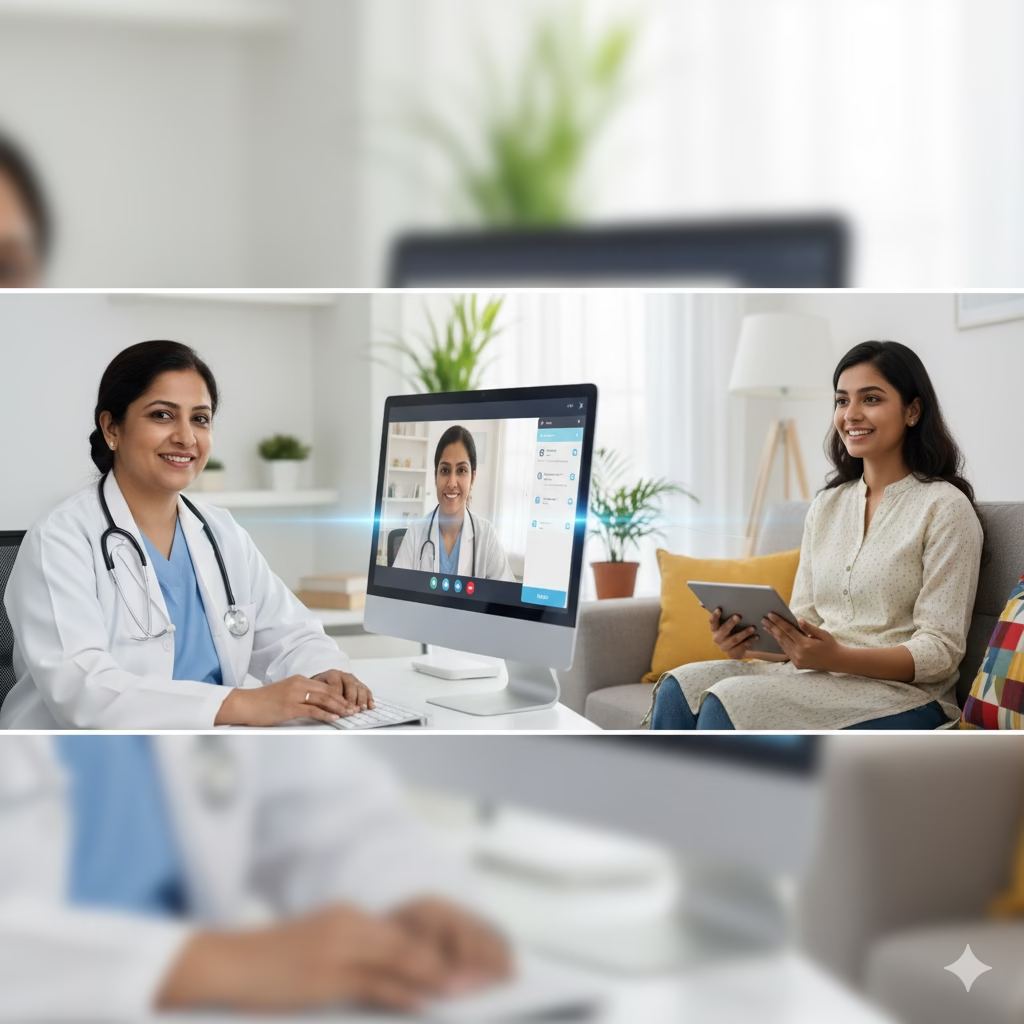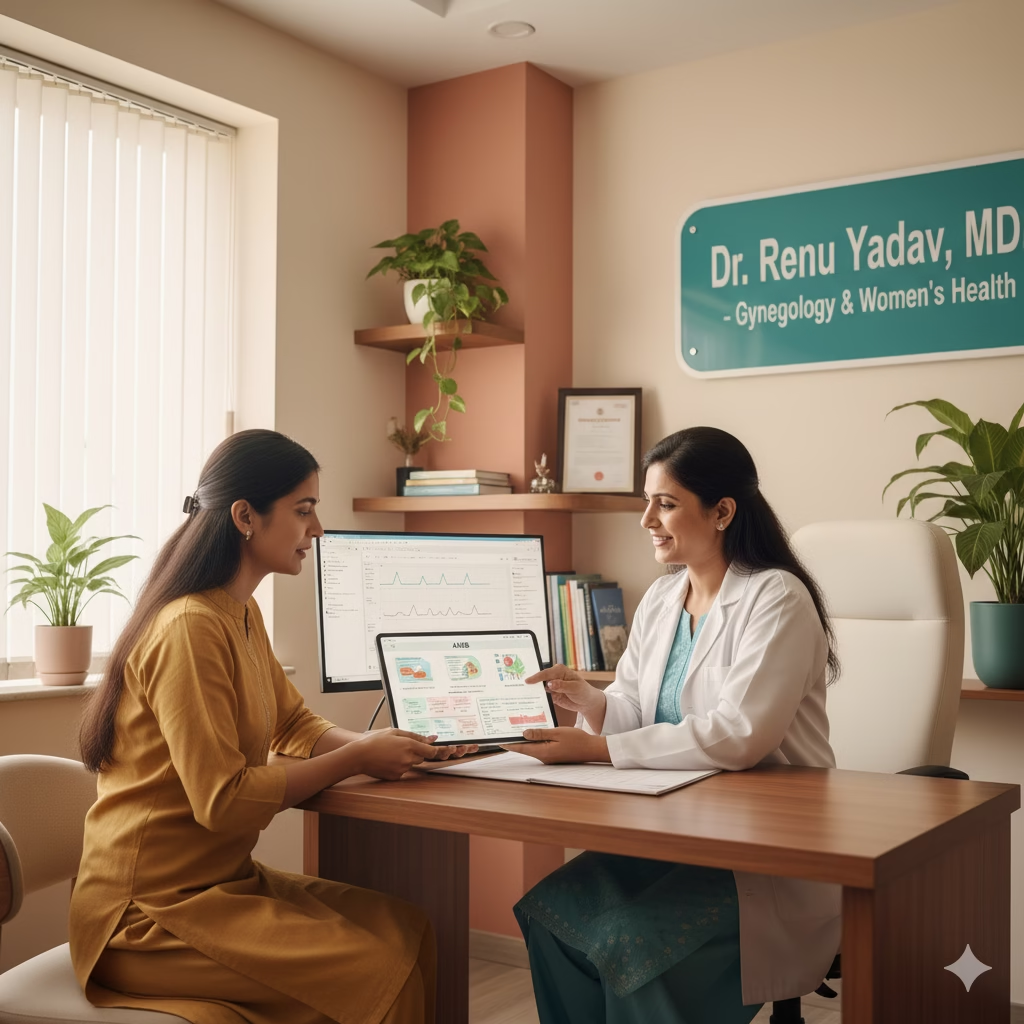The FemTech Revolution: How AI, Period Trackers, and Telemedicine are Transforming Women’s Health in India 💡

The conversation around women’s health is no longer confined to the clinic; it’s happening on smartphones, tablets, and through wearable devices. This dramatic shift is driven by FemTech—technology dedicated to addressing women’s health needs. In a country like India, where access to specialized care can be challenging due to distance, privacy concerns, or cultural barriers, digital innovation is proving to be a powerful equalizer. This movement, integrating Artificial Intelligence (AI), period tracking, and telemedicine, is not just about convenience; it is about empowerment, precision, and equitable access to the best gynecologist in Gurugram and beyond.
Digital Health Access: The Rise of Telemedicine in Gynecology
Telemedicine has dismantled geographic barriers, making high-quality consultations available to every woman, regardless of her location. This modality has proved particularly beneficial in gynecology, where issues often require continuous monitoring and follow-up.
- Breaking the Barriers of Distance and Privacy: For women in semi-urban or rural areas, travel to a city like Gurgaon for a routine check-up is a logistical hurdle. Telemedicine allows for primary consultations, follow-up advice, and management of chronic conditions (like PCOS or thyroid issues) from home. Furthermore, discussing sensitive reproductive or sexual health issues is often less daunting in a secure, private virtual setting.
- The Power of Synchronous Consultations: Real-time video calls with a specialist, such as a female gynae doctor Gurgaon, allow for personalized advice, prescription management, and review of lab reports. This ensures that expert medical input is received instantly, preventing delays in treatment that can escalate minor issues into major complications.
- Asynchronous Communication: The ability to securely share images, lab results, and detailed symptom logs with the doctor outside of a live call dramatically improves case preparation and reduces the time needed for accurate diagnosis.
Featured Snippet Definition: Telemedicine in Gynecology utilizes secure digital communication technologies (video, audio, and messaging) to provide remote clinical services, including consultations, diagnosis, monitoring, and health education, increasing access and privacy for women’s health care.
AI and Period Trackers: Personalizing the Menstrual Cycle

The modern period tracking app has evolved far beyond a simple calendar. Integrated with sophisticated AI and machine learning algorithms, these apps are transforming passive data logging into proactive health management tools.4
From Calendar to Clinical Tool
- Advanced Cycle Prediction: Early apps relied on simple averaging. Today’s AI-powered period trackers analyze thousands of data points—not just period dates, but also basal body temperature, sleep quality, stress levels, and exercise—to provide highly accurate predictions for menstruation and ovulation windows.
- Symptom Pattern Recognition: Users log symptoms like fatigue, acne, pain, and mood swings. The AI analyzes these longitudinal patterns to flag potential underlying conditions, often before the patient recognizes the correlation herself.5 This can be crucial for identifying precursors to conditions like Polycystic Ovary Syndrome (PCOS), Premenstrual Dysphoric Disorder (PMDD), or thyroid imbalances.
- Bridging the Data Gap: When a patient visits a gynecologist in Gurugram, they often struggle to recall exact dates or symptom severity.6 A detailed, AI-generated health report provides the doctor, such as Dr. Renu Yadav, with a precise clinical history, leading to faster, more effective diagnoses and treatment plans.
Data Privacy and Ethical Considerations
While the benefits are clear, it is essential for women to use apps that prioritize data security. It is important to choose platforms with transparent privacy policies and to understand how personal reproductive data is being used and protected.
The Role of AI in Diagnostics and High-Risk Care
AI’s ability to process vast amounts of complex data is where the true diagnostic and clinical value lies, especially in high-stakes areas like cancer screening and high-risk obstetrics.
Revolutionizing Cervical Cancer Screening
Cervical cancer remains a significant health challenge in India. AI is providing a pathway for more widespread, accurate, and immediate screening.
- AI-Enabled Colposcopy: Portable, affordable devices coupled with AI can analyze cervical images instantly, providing preliminary, expert-level feedback on the presence of pre-cancerous cells.8 This technology is vital for resource-limited settings, reducing the reliance on specialized pathologists who may only be available in major metropolitan hubs.
- Reducing Diagnostic Errors: AI systems offer a second layer of objective analysis, helping gynecologists, including the best gynecologist in Gurgaon, to reduce the risk of false-negative Pap smear readings and ensure early intervention.
Enhancing High-Risk Pregnancy Management
- Predictive Modeling for Complications: AI algorithms can analyze a pregnant woman’s comprehensive profile (ultrasound readings, lab values, pre-existing conditions) to predict the risk of complications like pre-eclampsia or gestational diabetes far earlier than traditional methods.9 This early warning system allows the care provider to implement proactive management strategies, ultimately improving maternal and fetal outcomes.
| AI Application | Gynecological Benefit | Impact on Patient Care |
| Deep Learning in Imaging | Rapid, accurate screening for cervical and ovarian cancers. | Early detection, reduced false-negatives, quicker treatment initiation. |
| Predictive Analytics | Forecasting high-risk pregnancies (e.g., pre-eclampsia). | Proactive monitoring, timely intervention, improved safety. |
| Algorithm-Based Trackers | Identifying patterns that suggest PCOS, PMDD, or hormonal imbalance. | Personalized diagnosis, evidence-based lifestyle and medical advice. |
Integrating FemTech into Modern Clinical Practice
The future of women’s health is a hybrid model—combining the efficiency of technology with the irreplaceable expertise and compassion of a skilled doctor. The role of the specialist evolves from a reactive healer to a proactive health coach and data interpreter.
- Informed Consultation: When a patient arrives at the clinic of a trusted specialist like Dr. Renu Yadav, the initial consultation is significantly more productive. The doctor reviews the digital data (period cycles, remote monitoring readings, symptom trends) and focuses the physical examination and testing immediately on the highest-risk areas identified by the technology.
- The Specialist as the Gatekeeper: While apps provide information, only an expert gynecologist in Gurugram can translate that data into a medical diagnosis and personalized treatment plan. For instance, an app may flag irregular periods (a common symptom of PCOS), but only a specialist can confirm the diagnosis through clinical assessment and lab work. This is why having access to an expert like Dr. Renu Yadav is essential.
- Minimally Invasive Surgery (MIS) & Robotics: Even surgery is becoming digital. Advanced laparoscopic and robotic systems, while not directly “FemTech” as consumer tools, rely heavily on sophisticated visualization and digital mapping, leading to better patient outcomes, less pain, and faster recovery—the ultimate goal of technological advancement in health.
The Challenges and the Way Forward

Despite the immense potential, the FemTech revolution faces hurdles, particularly in a diverse market like India.
- Digital Literacy and Access: The benefits of telemedicine and apps are limited by smartphone ownership, internet access, and the ability to navigate digital tools. Initiatives are needed to bridge this digital divide.
- Data Security and Ethics: Consumer trust hinges on the robust protection of highly sensitive health information, ensuring data is used solely for medical purposes and not commercial exploitation.
- Regulatory Clarity: Clear guidelines are needed from the government on the validation and regulation of AI medical devices and the practice of telemedicine to ensure patient safety and quality of care.10 The best gynecologist in Gurgaon operates within the highest ethical standards, prioritizing patient data protection.
Conclusion: Expert Care in a Digital Age
The FemTech revolution is fundamentally changing how women interact with their health. It empowers them with information and breaks down barriers to access. However, technology is only a powerful tool when wielded by an expert hand. The combination of cutting-edge digital platforms and the deep, personalized expertise of a highly experienced clinician offers the gold standard of care.
For comprehensive care that embraces the best of modern technology while maintaining compassionate, evidence-based practices, we highly recommend consulting Dr. Renu Yadav. As a leading female gynae doctor Gurgaon, she integrates advanced diagnostic tools and patient-first telemedicine strategies to deliver optimal health outcomes across all life stages.11
Embrace the future of women’s wellness. Schedule a virtual or in-person consultation with Dr. Renu Yadav today to discuss your health concerns and explore how modern digital tools can support your journey to better health.



